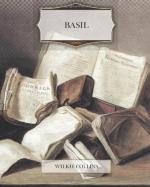A presentiment arose within me, that in this still and solitary hour would occur my decisive, my final struggle with myself. I felt that my heart’s life or death was set on the hazard of the night.
This new love that was in me; this giant sensation of a day’s growth, was first love. Hitherto, I had been heart-whole. I had known nothing of the passion, which is the absorbing passion of humanity. No woman had ever before stood between me and my ambitions, my occupations, my amusements. No woman had ever before inspired me with the sensations which I now felt.
In trying to realise my position, there was this one question to consider; was I still strong enough to resist the temptation which accident had thrown in my way? I had this one incentive to resistance: the conviction that, if I succumbed, as far as my family prospects were concerned, I should be a ruined man.
I knew my father’s character well: I knew how far his affections and his sympathies might prevail over his prejudices—even over his principles—in some peculiar cases; and this very knowledge convinced me that the consequences of a degrading marriage contracted by his son (degrading in regard to rank), would be terrible: fatal to one, perhaps to both. Every other irregularity—every other offence even—he might sooner or later forgive. This irregularity, this offence, never—never, though his heart broke in the struggle. I was as sure of it, as I was of my own existence at that moment.
I loved her! All that I felt, all that I knew, was summed up in those few words! Deteriorating as my passion was in its effect on the exercise of my mental powers, and on my candour and sense of duty in my intercourse with home, it was a pure feeling towards her. This is truth. If I lay on my death-bed, at the present moment, and knew that, at the Judgment Day, I should be tried by the truth or falsehood of the lines just written, I could say with my last breath: So be it; let them remain.
But what mattered my love for her? However worthy of it she might be, I had misplaced it, because chance—the same chance which might have given her station and family—had placed her in a rank of life far—too far—below mine. As the daughter of a “gentleman,” my father’s welcome, my father’s affection, would have been bestowed on her, when I took her home as my wife. As the daughter of a tradesman, my father’s anger, my father’s misery, my own ruin perhaps besides, would be the fatal dower that a marriage would confer on her. What made all this difference? A social prejudice. Yes: but a prejudice which had been a principle—nay, more, a religion—in our house, since my birth; and for centuries before it.
(How strange that foresight of love which precipitates the future into the present! Here was I thinking of her as my wife, before, perhaps, she had a suspicion of the passion with which she had inspired me—vexing my heart, wearying my thoughts, before I had even spoken to her, as if the perilous discovery of our marriage were already at hand! I have thought since how unnatural I should have considered this, if I had read it in a book.)




